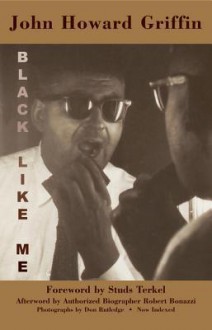Black Like Me: The Definitive Griffin Estate Edition
He trudged southern streets searching for a place where he could eat or rest, looking vainly for a job other than menial labor, feeling the "hate stare." He was John Griffin, a white man who darkened the color of his skin and crossed the line into a country of hate, fear, and hopelessness--the...
show more
He trudged southern streets searching for a place where he could eat or rest, looking vainly for a job other than menial labor, feeling the "hate stare." He was John Griffin, a white man who darkened the color of his skin and crossed the line into a country of hate, fear, and hopelessness--the country of the American Black man.
show less
Format: ebook
ISBN:
9781609401085 (1609401085)
Publish date: April 1st 2006
Publisher: Wings Press (TX)
Pages no: 200
Edition language: English
Category:
Classics,
Non Fiction,
Autobiography,
Memoir,
Biography,
History,
Cultural,
African American,
Sociology,
Biography Memoir,
Race

This book is the diary of John Howard Griffin, a journalist who decided to conduct a social experiment about segregation in the American South. In the winter of 1959, John started taking vitiligo pills to turn his skin dark brown. He left upper-class white society to travel through the South as an u...

I remember reading this for a psychology class in college and I loved it.

Have to read this for school in a couple of weeks, so thought I'd just add it now :) And apparently we need permission to read this book from our parents, which I think is ridiculous. But I am really excited to read this... the premiss sounds really good!

I can't say enough good things about this book. I thank men like John Howard Griffin who took a stand against racism despite the fact that their own people were vehemently against it. This entire book was a fantastic sociological and journalistic investigation of colour relations in the South in the...

I had heard about this book for so long, I wondered why I'd never read it. So glad I finally decided to!I kind of wish someone would do this experiment again. I mean, it feels like we've come an awful long way from 1959, and in a lot of significant ways I think we have. But I can't give an accurate ...






 11 years ago
11 years ago